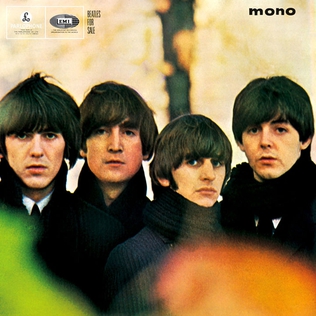
Beatles for Sale is the fourth studio album by the English rock band the Beatles. It was released on 4 December 1964 in the United Kingdom on EMI's Parlophone label. The album marked a departure from the upbeat tone that had characterised the Beatles' previous work, partly due to the band's exhaustion after a series of tours that had established them as a worldwide phenomenon in 1964. Beatles for Sale was not widely available in the US until 1987, when the Beatles' catalogue was standardised for release on CD. Instead, eight of the album's fourteen tracks appeared on Capitol Records' concurrent release, Beatles '65, issued in North America only.

Maurice Ernest Gibb was a British musician. He achieved worldwide fame as a member of the pop group Bee Gees. Although his elder brother Barry Gibb and fraternal twin brother Robin Gibb were the group's main lead singers, most of their albums included at least one or two songs featuring Maurice's lead vocals, including "Lay It on Me", "Country Woman" and "On Time". The Bee Gees are one of the most successful pop-rock groups of all time.

"The Long and Winding Road" is a song by the English rock band the Beatles from their 1970 album Let It Be. It was written by Paul McCartney and credited to Lennon–McCartney. When issued as a single in May 1970, a month after the Beatles' break-up, it became the group's 20th and last number-one hit on the Billboard Hot 100 chart in the United States.
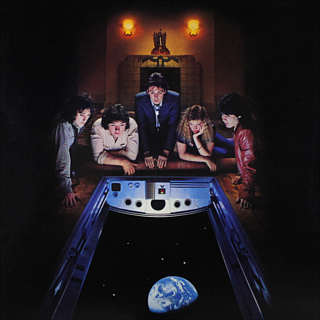
Back to the Egg is the seventh and final studio album by the British–American rock band Wings, released in June 1979 on Parlophone in the UK and Columbia Records in North America. Co-produced by Chris Thomas, the album reflects band leader Paul McCartney's embracing of contemporary musical trends such as new wave and punk, and marked the arrival of new Wings members Laurence Juber and Steve Holley. Back to the Egg adopts a loose conceptual theme around the idea of a working band, and its creation coincided with a period of considerable activity for the group, which included making a return to touring and work on several television and film projects.
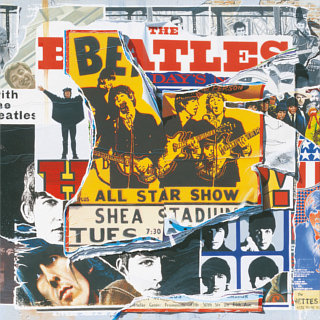
Anthology 2 is a compilation album by the Beatles, released on 18 March 1996 by Apple Records as part of The Beatles Anthology series. It features rarities, outtakes and live performances from the 1965 sessions for Help! until the sessions immediately prior to their trip to India in February 1968. It is the second in a trilogy of albums with Anthology 1 and Anthology 3, all of which tie in with the televised special The Beatles Anthology. The opening track is "Real Love", the second of the two recordings that reunited the Beatles for the first time since the band's break-up. Like its predecessor, the album topped the Billboard 200 album chart and has been certified 4× Platinum by the RIAA.

"Real Love" is a song written by the English musician John Lennon, formerly of the Beatles. He recorded six demos of the song in 1979 and 1980 with "Real Life", a different song that merged with "Real Love". In 1988, the sixth take was posthumously released for the documentary soundtrack Imagine: John Lennon. In 1995, his demo was completed by his former Beatles bandmates as part of the Beatles Anthology project, along with "Free as a Bird".
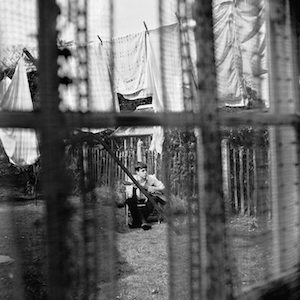
Chaos and Creation in the Backyard is the thirteenth solo studio album by Paul McCartney, released on 12 and 13 September, 2005. Some 18 months in the making, the album was produced by Radiohead and Beck collaborator Nigel Godrich at George Martin's suggestion.
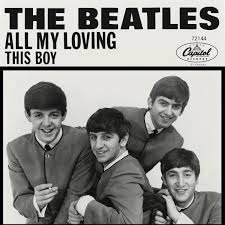
"All My Loving" is a song by the English rock band the Beatles, from their second UK album With the Beatles (1963). It was written by Paul McCartney, and produced by George Martin. Though not officially released as a single in the United Kingdom or the United States, the song drew considerable radio airplay, prompting EMI to issue it as the title track of an EP. The song was released as a single in Canada, where it became a number one hit. The Canadian single was imported into the US in enough quantities to peak at number 45 on the US Billboard Hot 100 in April 1964.
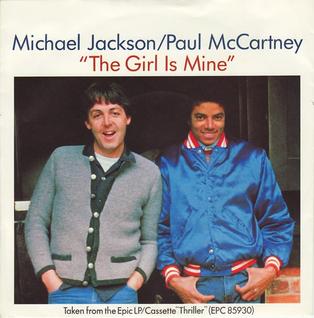
"The Girl Is Mine" is a song recorded by American singer Michael Jackson and English singer and musician Paul McCartney. The track was written and co-produced by Jackson and produced by Quincy Jones. It was released as the first single for Jackson's sixth solo album, Thriller (1982). The song was recorded at Westlake Studios, Los Angeles, from April 14 to 16, 1982. The year before, Jackson and McCartney had recorded "Say Say Say" and "The Man" for the latter's fifth solo album, Pipes of Peace (1983). Although "The Girl Is Mine" was released as a single, Jackson and McCartney never performed the song live.
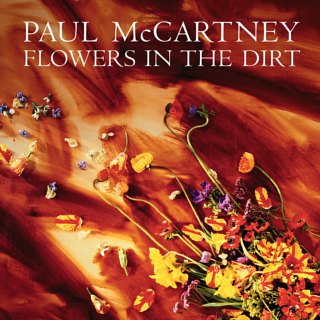
Flowers in the Dirt is the eighth solo studio album by Paul McCartney. The album was released on 5 June 1989 on Parlophone, as he was embarking on his first world tour since the Wings Over the World tour in 1975–76. It earned McCartney some of his best reviews for an album of original songs since Tug of War (1982). The album made number one in the United Kingdom and Norway and produced several hit singles. The album artwork was a collaboration between artist Brian Clarke, who painted the canvas and arranged the flowers, and Linda McCartney, who produced the cover photography.
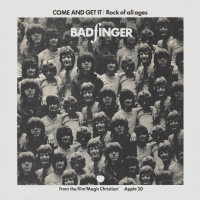
"Come and Get It" is a song composed by English singer-songwriter Paul McCartney for the 1969 film The Magic Christian. The song was performed by Badfinger, produced by McCartney and issued as a single 5 December 1969 in the UK, and 12 January 1970 in the US, on the Beatles' Apple label. It was the band's first release under the Badfinger name and was their international breakthrough, hitting the top 10 in both the UK and US singles charts.

"Band on the Run" is a song by the British–American rock band Paul McCartney and Wings, released as the title track to their 1973 album Band on the Run. The song was released as a single in April 1974 in the US and in June 1974 in the UK, following the success of "Jet", and became an international chart success. The song topped the charts in the United States, also reaching number 3 in the United Kingdom. The single sold over one million copies in 1974 in America. It has since become one of the band's most famous songs.

The studio practices of the Beatles evolved during the 1960s and, in some cases, influenced the way popular music was recorded. Some of the effects they employed were sampling, artificial double tracking (ADT) and the elaborate use of multitrack recording machines. They also used classical instruments on their recordings and guitar feedback. The group's attitude towards the recording process was summed up by Paul McCartney: "We would say, 'Try it. Just try it for us. If it sounds crappy, OK, we'll lose it. But it might just sound good.' We were always pushing ahead: Louder, further, longer, more, different."
"Grow Old with Me" is one of the final songs written by John Lennon. It was recorded by Lennon as a demo while in Bermuda in 1980, and later appeared on the posthumous album Milk and Honey in 1984. It was also allegedly planned as a possible reunion single by his former bandmates during the making of The Beatles Anthology.

Odetta Sings is a 1970 album by Odetta. It is her only album for the Polydor label.

"Goodbye" is a song written by Paul McCartney and performed by Mary Hopkin. It was released on 28 March 1969, and it reached No. 2 in the UK singles chart, prevented from reaching the top position by the Beatles' single "Get Back". In the US, released 7 April 1969, the song reached No. 13 on the singles chart. In the Netherlands and Ireland the single peaked at No. 1.

Kisses on the Bottom is the fifteenth solo studio album by Paul McCartney, consisting primarily of covers of traditional pop music and jazz. Released in February 2012 on Starbucks' Hear Music label, it was McCartney's first studio album since Memory Almost Full in 2007. The album was produced by Tommy LiPuma and includes just two original compositions by McCartney: "My Valentine" and "Only Our Hearts". The former features jazz drummer Karriem Riggins. Kisses on the Bottom peaked at number 3 on the UK Albums Chart and number 5 on the US Billboard 200, while also topping Billboard magazine's Jazz Albums chart.
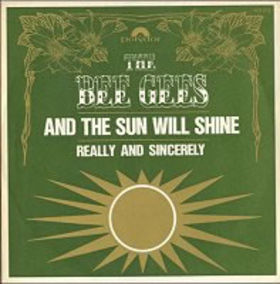
"And the Sun Will Shine" is a song by the British rock band Bee Gees, it was written by Barry Gibb, Robin Gibb and Maurice Gibb and released in February 1968 on the album Horizontal. The song's opening chord was D7, consisting of the notes D, F♯, A, and C.

Kubo and the Two Strings (Original Motion Picture Soundtrack) is the soundtrack album to the 2016 film of the same name. The album featured original score composed by Italian composer Dario Marianelli, with a cover rendition of The Beatles-band member George Harrison's "While My Guitar Gently Weeps" performed by Regina Spektor. The score consisted of traditional Japanese music blended with Western and Eastern sounds, was recorded using ethnic instruments from Japan, in addition to modern instruments and orchestra, in order to create that feel.


















